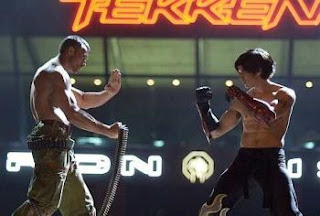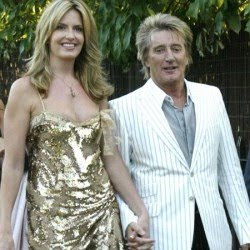Tekken surprisingly appealing
 Not too far in the future, civilisation as we know it is no more. World wars have ceased, but the fighting and killing goes on. The ravaged world is ruled not by governments, but by powerful mega-corporations.
Not too far in the future, civilisation as we know it is no more. World wars have ceased, but the fighting and killing goes on. The ravaged world is ruled not by governments, but by powerful mega-corporations.The greatest of them all, Tekken, controls large territories which include the former United States.
Within the protective walls of Tekken City, the rich and famous strut the corridors of power. Outside, however, the oppressed civilians are gripped by fear and despair. Living conditions leave much to be desired and resources are scarce. The Jacks, Tekken’s highly-efficient masked robotic security units, patrol the area, capturing and killing the huddled masses at will.
In The Anvil, one of the slums outside the walls, Jin (Jon Foo) watches the Jacks kill his mother (Tamlyn Tomita). The young man, who makes a living by running through danger zones (think desolate ruins, bright search lights and whizzing bullets) to deliver contraband, vows to avenge her untimely death.
Armed with superior fighting skills, he gets into the city by joining the Iron Fist, a glorified martial arts tournament where the winner is bestowed with more riches that he dares hope. As the countdown to the grand finale starts, Jin and the other fighters uncover a menacing secret and discover that they are mere pawns in a bigger game.
From this instant on, the movie takes on a darker tone.
Based on a series of video games which go by the same name (developed and published by Namco), the movie makes a deliberate attempt at recreating its videogame setting. It flaunts a suitably detailed fighting arena that features flashing neon lights, muscular men, and curvy, deadly women decked out in the kind of latex-and-leather costumes no sane person would consider wearing to combat.
Well, this is a movie based on a video game, no?
The plot is easy to follow and many things are presented in an explicit manner — explosions kill people, the fights are brutal and bloody, and there is no saving the bad guys from themselves. Unfortunately, the most evil of the characters, Kazuya (Ian Anthony Dale) is quite a pathetic villain.
The character’s biggest flaw must surely be how he totally lacks charisma. You are indifferent to what happens to him, even the comeuppance he richly deserves. Purists, beware: Some liberty is taken with the physical appearances of one or two of the characters, which might be a tad disorienting.
The movie hard-sells its fighting scenes and also Jin’s emotional coming-of-age journey as he seeks retribution. While it succeeds for the most part with the fight sequences, it fails where Jin’s journey is concerned.
Character development is poor, with Jin coming across as shallow and lacking in warmth. We see Jin move mechanically from angry, confused young man to determined leader, but we don’t feel it. He gets less likeable, less believable and more forgettable as the film progresses.
Viewers will root for him not because of who he is or what he does, but because we are drawn to the others in the movie who sincerely care for him. This is where Steve Fox (Luke Goss) and Christie Monteiro (Kelly Overton) deserve a mention: They inject a much-needed human touch to an otherwise hard and unyielding fighting-game flick.
Stay seated when the credits start to roll for a short scene involving Tekken’s CEO Heihachi Mishima (Cary Tagawa), which hints at a sequel.
The first few minutes of the movie is agonisingly tacky, visually, but it does get better.
For something based on a video game, Tekken is not a terrible effort.
source-http://ecentral.my



Comments
Post a Comment